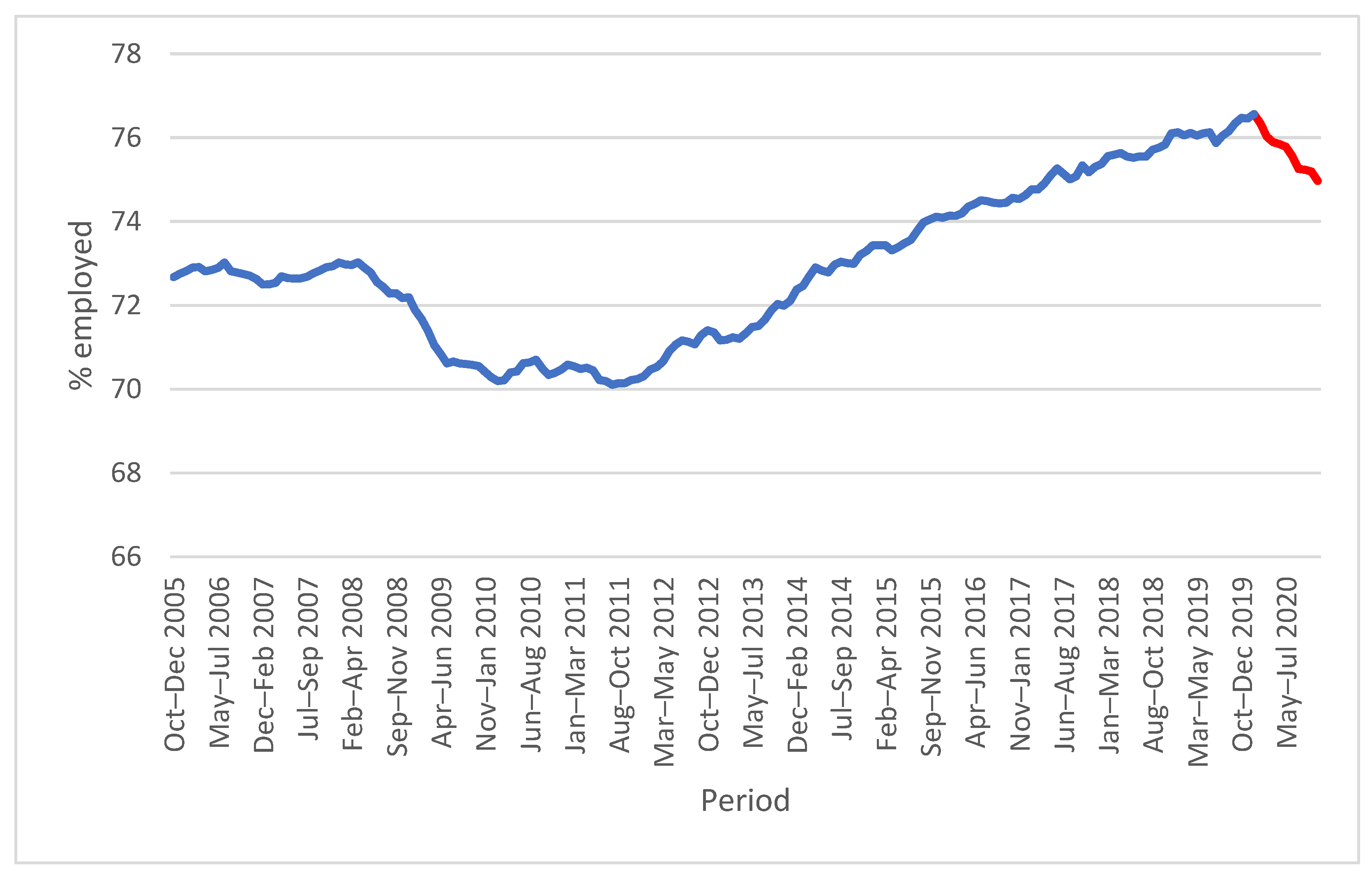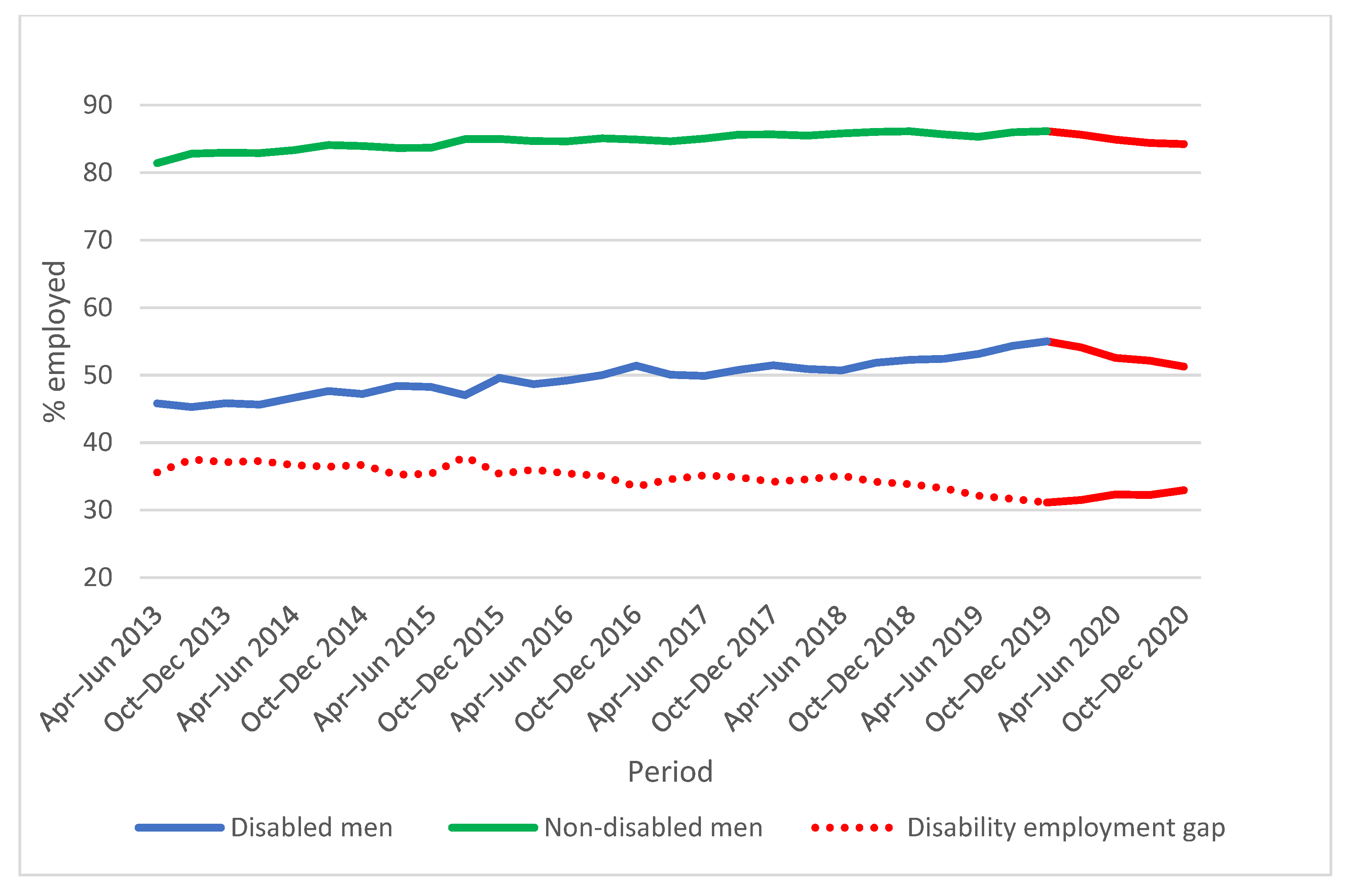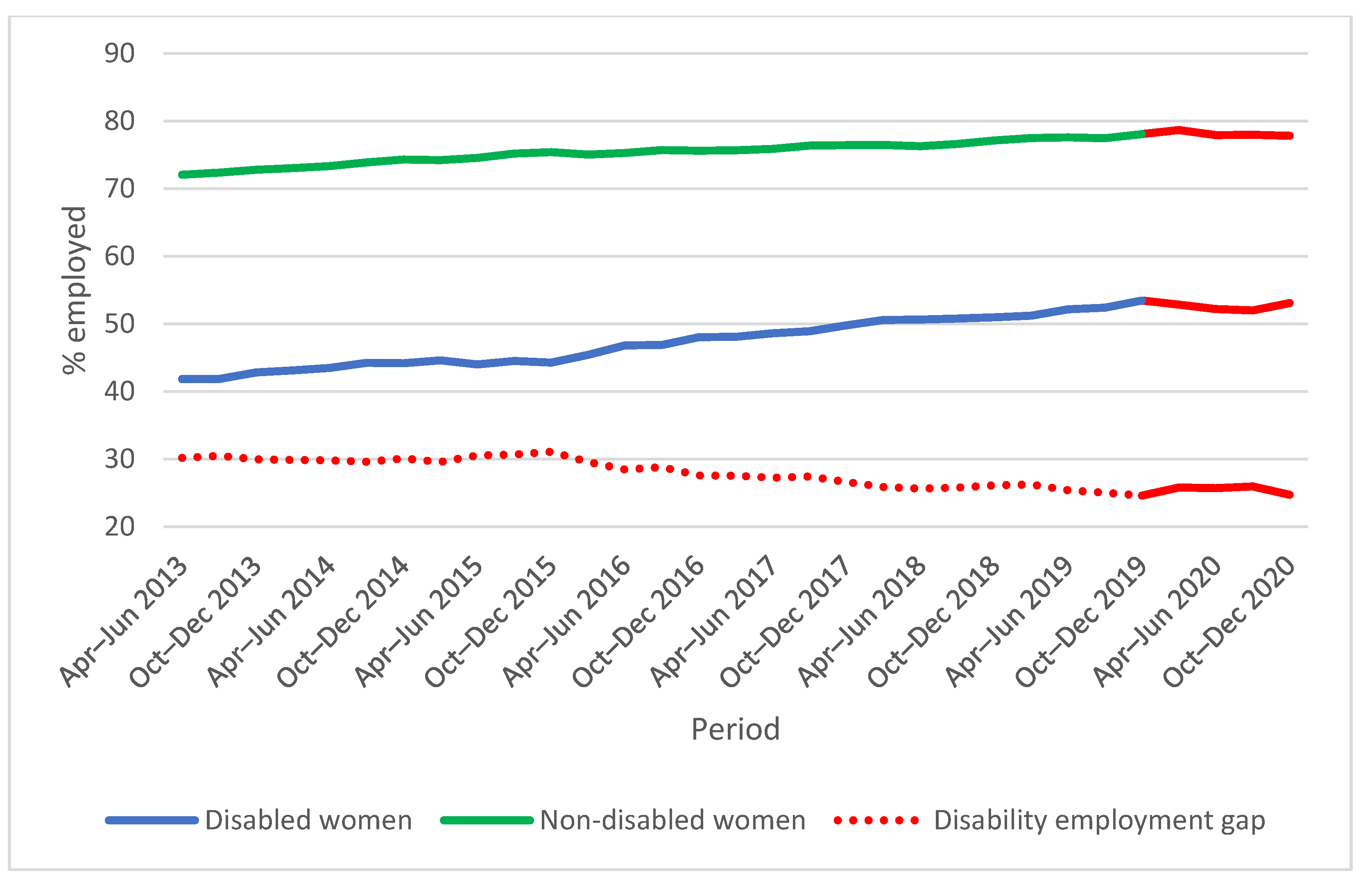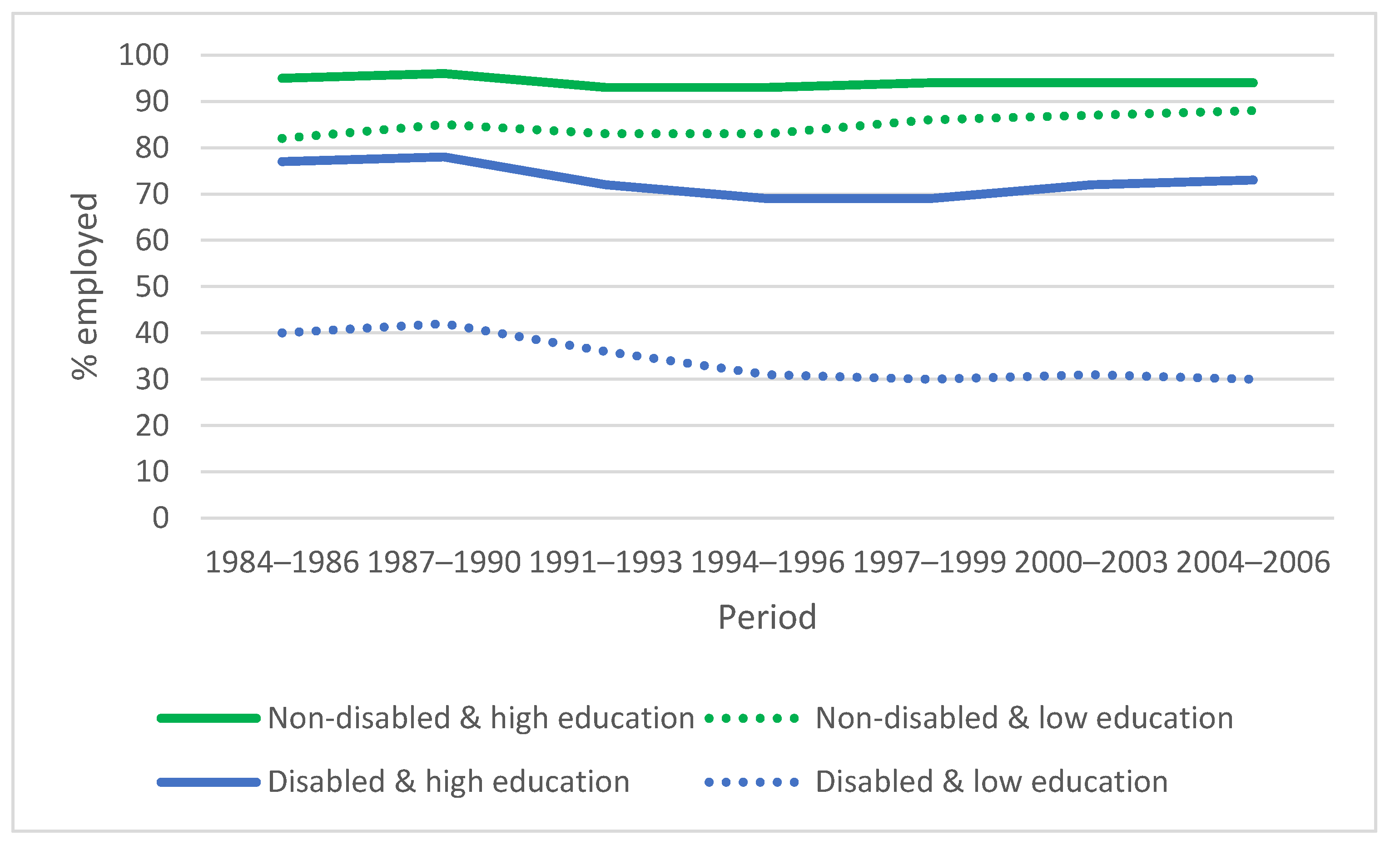Will Disabled Workers Be Winners or Losers in the Post-COVID-19 Labour Market?
Abstract
:1. Introduction
2. The Disability Employment Gap: Pre-COVID-19
- -
- is highest for people with mental illnesses and severe/specific learning difficulties (53 and 64 percentage points respectively);
- -
- varies by gender (a gap of 32 percentage points for men; 25 for women);
- -
- increases with age (a gap of 35 percentage points for workers aged 50–64);
- -
- increases with decreasing levels of educational attainment, with the largest gap among people without educational qualifications (41 percentage points);
- -
- varies by UK region, and is highest in Northern Ireland (42 percentage points) and lowest in the Southeast of England (23%) [8].
3. Impact of the COVID-19 Recession on the UK Disability Employment Gap
4. Increased Access to Home-Working: A Cultural Shift to Level the Playing Field?
5. Promoting the Health and Wellbeing of Disabled Home-Workers
6. Inequities in Homeworking Opportunities
7. Wider Impacts of Increased Home-Working
8. Conclusions
Funding
Conflicts of Interest
References
- World Health Organization Health Emergency Dashboard. Available online: https://covid19.who.int/ (accessed on 27 May 2021).
- Public Health England. Disparities in the Risks and Outcomes of COVID-19. 2020. Available online: https://assets.publishing.service.gov.uk/government/uploads/system/uploads/attachment_data/file/892085/disparities_review.pdf (accessed on 27 May 2021).
- Office for National Statistics. Updated Estimates of Coronavirus (COVID-19) Related Deaths by Disability Status, England: 24 January to 20 November 2020. 2021. Available online: https://www.ons.gov.uk/peoplepopulationandcommunity/birthsdeathsandmarriages/deaths/articles/coronaviruscovid19relateddeathsbydisabilitystatusenglandandwales/24januaryto20november2020#overview-of-covid-19-related-deaths-by-disability-status (accessed on 27 May 2021).
- Holland, P.; Burström, B.; Whitehead, M.; Diderichsen, F.; Dahl, E.; Ng, E.; Barr, B.; Nylén, L.; Chen, W.; Thielen, K.; et al. How do macro-level contexts and policies affect the employment chances of chronically ill and disabled people? Paper I: The impact of recession and de-industrialisation. Int. J. Health Serv. 2011, 41, 395–413. [Google Scholar] [CrossRef] [PubMed]
- Office for National Statistics. Disability Pay Gaps in the UK: 2018. 2019. Available online: https://www.ons.gov.uk/peoplepopulationandcommunity/healthandsocialcare/disability/articles/disabilitypaygapsintheuk/2018 (accessed on 27 May 2021).
- The Work Foundation. Standing Together? COVID-19 and Worker Insecurity in 2020 and Beyond. 2020. Available online: https://www.lancaster.ac.uk/media/lancaster-university/content-assets/documents/lums/work-foundation/InsecurityBriefing-June20final.pdf (accessed on 27 May 2021).
- Office for National Statistics. Disability and Employment, UK: 2019. 2019. Available online: https://www.ons.gov.uk/peoplepopulationandcommunity/healthandsocialcare/disability/bulletins/disabilityandemploymentuk/2019#main-points (accessed on 27 May 2021).
- House of Commons Library. Briefing Paper Number 7540, 13 August 2020. Disabled People in Employment. Available online: https://researchbriefings.files.parliament.uk/documents/CBP-7540/CBP-7540.pdf (accessed on 27 May 2021).
- Baumberg Geiger, B.; van der Wel, K.A.; Tøge, A. Success and failure in narrowing the disability employment gap: Comparing levels and trends across Europe 2002–2014. BMC Public Health 2017, 17, 928. [Google Scholar]
- Waddell, G.; Kim Burton, A. Is Work Good for Your Health and Well-Being? An Independent Review. 2006. Available online: https://www.gov.uk/government/publications/is-work-good-for-your-health-and-well-being (accessed on 27 May 2021).
- Strandh, M.; Winefield, A.; Nilsson, K.; Hammarström, A. Unemployment and mental health scarring during the life course. Eur. J. Public Health 2014, 24, 440–445. [Google Scholar] [CrossRef]
- McKee-Ryan, F.; Song, Z.; Wanberg, C.R.; Kinicki, A.J. Psychological and Physical Well-Being During Unemployment: A Meta-Analytic Study. J. Appl. Psychol. 2005, 90, 53–76. [Google Scholar] [CrossRef] [PubMed] [Green Version]
- Office for National Statistics. GDP Monthly Estimate, UK: September 2020. Available online: https://www.ons.gov.uk/economy/grossdomesticproductgdp/bulletins/gdpmonthlyestimateuk/september2020 (accessed on 27 May 2021).
- Bank of England. Agents’ Summary of Business Conditions—2020 Q2. 2020. Available online: https://www.bankofengland.co.uk/agents-summary/2020/2020-q2 (accessed on 27 May 2021).
- Office for National Statistics. A08: Labour Market Status of Disabled People. 2021. Available online: https://www.ons.gov.uk/employmentandlabourmarket/peopleinwork/employmentandemployeetypes/datasets/labourmarketstatusofdisabledpeoplea08 (accessed on 27 May 2021).
- Schur, L.A.; Ameri, M.; Kruse, D. Telework after COVID: A “silver lining” for workers with disabilities? J. Occup. Rehabil. 2020, 30, 521–536. [Google Scholar] [CrossRef]
- Holland, P.; Nylén, L.; Thielen, K.; van der Wel, L.A.; Chen, W.; Barr, B.; Burström, B.; Diderichsen, F.; Andersen, P.K.; Dahl, E.; et al. How do macro-level contexts and policies affect the employment chances of chronically ill and disabled people? Part II: The impact of active and passive labour market policies. Int. J. Health Serv. 2011, 41, 415–430. [Google Scholar] [CrossRef] [PubMed]
- Avdiu, B.; Nayyar, G. When face-to-face interactions become an occupational hazard: Jobs in the time of COVID-19. Econ. Lett. 2020, 197, 109648. [Google Scholar] [CrossRef]
- Office for National Statistics. Outcomes for Disabled People in the UK: 2020. 2021. Available online: https://www.ons.gov.uk/peoplepopulationandcommunity/healthandsocialcare/disability/articles/outcomesfordisabledpeopleintheuk/2020 (accessed on 27 May 2021).
- Norström, F.; Virtanen, P.; Hammarström, A.; Gustafsson, P.E.; Janlert, U. How does unemployment affect self-assessed health? A systematic review focusing on subgroup effects. BMC Public Health 2014, 14, 1310. [Google Scholar] [CrossRef] [PubMed]
- Maroto, M.L.; Pettinicchio, D.; Lukk, M. Working Differently or Not at All: COVID-19′s Effects on Employment among People with Disabilities and Chronic Health Conditions. Sociol. Perspect. 2021. [Google Scholar] [CrossRef]
- Collins, C.; Ocampo, O.; Paslaski, S. Billionaire Bonanza 2020: Wealth Windfalls, Tumbling Taxes, And Pandemic Profiteers. Institute for Policy Studies, 2020. Available online: https://ips-dc.org/billionaire-bonanza-2020/ (accessed on 27 May 2021).
- Furceri, D.; Loungani, P.; Ostry, J.D.; Pizzuto, P. Will Covid-19 affect inequality? Evidence from past pandemics. Covid Econ. 2020, 12, 138–157. [Google Scholar]
- Scope. Disabled People Fear Being ‘Pushed Out’ of Post-Lockdown World as Shielding Pauses. 2020. Available online: https://www.scope.org.uk/media/press-releases/disabled-people-pushed-out-lockdown/ (accessed on 27 May 2021).
- O’Connor, D.B.; Aggleton, J.P.; Chakrabarti, B.; Cooper, C.L.; Creswell, C.; Dunsmuir, S.; Fiske, S.T.; Gathercole, S.; Gough, B.; Ireland, J.L.; et al. Research priorities for the COVID-19 pandemic and beyond: A call to action for psychological science. Br. J. Psychol. 2020, 111, 603–629. [Google Scholar] [CrossRef]
- Foster, D.; Hirst, N. Legally Disabled? The Impact of COVID-19 on the Employment and Training of Disabled Lawyers in England and Wales: Opportunities for Job Re-Design and Best Practice. Cardiff University, 2020. Available online: http://legallydisabled.com/wp-content/uploads/2020/11/Covid-report-TLS-Oct-2020-FINAL.pdf (accessed on 27 May 2021).
- Legislation.gov.uk. 2010. Equality Act 2010. Available online: http://www.legislation.gov.uk/ukpga/2010/15/contents (accessed on 27 May 2021).
- Holland, P.; Clayton, S. Navigating employment retention with a chronic health condition: A meta-ethnography of the employment experiences of people with musculoskeletal disorders in the UK. Disabil. Rehabil. 2020, 42, 1071–1086. [Google Scholar] [CrossRef] [Green Version]
- Pinder, R. Bringing back the body without the blame? The experience of ill and disabled people at work. Sociol. Health Illn. 1995, 17, 605–631. [Google Scholar] [CrossRef]
- Holland, P.; Collins, A.M. “Whenever I can I push myself to go to work”: A qualitative study of experiences of sickness presenteeism among workers with rheumatoid arthritis. Disabil. Rehabil. 2018, 40, 404–413. [Google Scholar] [CrossRef] [PubMed]
- Holland, P.; Collins, A.M. Supporting and retaining employees with rheumatoid arthritis: The importance of workplace social support. Int. J. Hum. Resour. Manag. 2020. [Google Scholar] [CrossRef]
- Gewurtz, R.; Kirsh, B. Disruption, disbelief and resistance: A meta-synthesis of disability in the workplace. Work 2009, 34, 33–44. [Google Scholar] [CrossRef]
- Lupton, P.; Haynes, B. Teleworking—The perception-reality gap. Facilities 2000, 18, 323–327. [Google Scholar] [CrossRef]
- Felstead, A.; Henseke, G. Assessing the growth of remote working and its consequences for effort, well-being and work-life balance. New Technol. Work. Employ. 2017, 32, 195–212. [Google Scholar] [CrossRef] [Green Version]
- Office for National Statistics. Coronavirus and Homeworking in the UK Labour Market: 2019. 2020. Available online: https://www.ons.gov.uk/employmentandlabourmarket/peopleinwork/employmentandemployeetypes/articles/coronavirusandhomeworkingintheuklabourmarket/2019 (accessed on 27 May 2021).
- Felstead, A.; Reuschke, D. ‘Homeworking in the UK: Before and during the 2020 Lockdown’, WISERD Report, Cardiff: Wales Institute of Social and Economic Research. 2020. Available online: https://wiserd.ac.uk/publications/homeworking-uk-and-during-2020-lockdown (accessed on 27 May 2021).
- Chung, H.; Seo, H.; Forbes, S.; Birkett, H. Working from Home during the COVID-19 Lockdown: Changing Preferences and the Future of Work. University of Birmingham and University of Kent. 2020. Available online: http://wafproject.org/covidwfh (accessed on 27 May 2021).
- Ipsen, C.; Kirchner, K.; Hansen, J.P. Experiences of Working from Home in Times of Covid-19 International Survey Conducted the First Months of the National Lockdowns March–May. 2020. Available online: https://orbit.dtu.dk/en/publications/experiences-of-working-from-home-in-times-of-covid-19-internation (accessed on 27 May 2021).
- West, W.D.; Anderson, A. Telework and employees with disabilities: Accommodation and funding options. J. Vocat. Rehabil. 2005, 23, 115–122. [Google Scholar]
- Kaplan, S.; Weiss, S.; Moon, N.W.; Baker, P. A Framework for Providing Telecommuting as a Reasonable Accommodation: Some Considerations on a Comparative Case Study. Work 2006, 27, 431–440. [Google Scholar]
- McNaughton, D.; Rackensperger, T.; Dorn, D.; Wilson, N. ‘Home Is at Work and Work Is at Home’: Telework and Individuals Who Use Augmentative and Alternative Communication. Work 2014, 48, 117–126. [Google Scholar] [CrossRef]
- Linden, M.; Milchus, K. Teleworkers with disabilities: Characteristics and accommodation use. Work 2014, 47, 473–483. [Google Scholar] [CrossRef] [PubMed]
- The Remote Work Report by GitLab: The Future of Work is Remote. March 2020. Available online: https://page.gitlab.com/rs/194-VVC-221/images/the-remote-work-report-by-gitlab.pdf (accessed on 27 May 2021).
- Foster, D.; Hirst, N. Legally Disabled? The Career Experiences of Disabled People Working in the Legal Profession. Cardiff University, 2020. Available online: http://legallydisabled.com/researchreports/ (accessed on 27 May 2021).
- Bloom, N.; Liang, J.; Roberts, J.; Ying, Z.J. Does Working from Home Work? Evidence from a Chinese Experiment. Q. J. Econ. 2015, 130, 165–218. [Google Scholar] [CrossRef] [Green Version]
- Forbes, S.; Birkett, H.; Evans, L.; Chung, H.; Whiteman, J. Managing Employees during the COVID-19 Pandemic: Flexible Working and the Future of Work; University of Kent: Canterbury, UK; University of Birmingham: Birmingham, UK, 2021. [Google Scholar]
- Parry, J.; Young, Z.; Bevan, S.; Veliziotis, M.; Baruch, Y.; Beigi, M.; Bajorek, Z.; Salter, E.; Tochia, C. Working from Home under COVID-19 Lockdown: Transitions and Tensions, Work after Lockdown. 2021. Available online: https://www.employment-studies.co.uk/resource/working-home-under-covid-19-lockdown (accessed on 27 May 2021).
- Institute of Directors. Homeworking Here to Stay. 2020. Available online: https://www.iod.com/news/news/articles/Home-working-here-to-stay-new-IoD-figures-suggest (accessed on 27 May 2021).
- Department for Work and Pensions. New Help on Offer for Disabled People Working from Home during the Pandemic. 2020. Available online: https://www.gov.uk/government/news/new-help-on-offer-for-disabled-people-working-from-home-during-the-pandemic (accessed on 27 May 2021).
- Emerson, E.; Fortune, N.; Llewellyn, G.; Stancliffe, R. Loneliness, social support, social isolation and wellbeing among working age adults with and without disability: Cross-sectional study. Disabil. Health J. 2021, 14. [Google Scholar] [CrossRef] [PubMed]
- University of Cambridge. “Pay the Wi-Fi or Feed the Children”: Coronavirus has Intensified the UK’s Digital Divide. 2020. Available online: https://www.cam.ac.uk/stories/digitaldivide (accessed on 27 May 2021).
- Office for National Statistics. Exploring the UK’s Digital Divide. 2019. Available online: https://www.ons.gov.uk/peoplepopulationandcommunity/householdcharacteristics/homeinternetandsocialmediausage/articles/exploringtheuksdigitaldivide/2019-03-04#what-is-the-pattern-of-internet-usage-among-disabled-people (accessed on 27 May 2021).
- Bambra, C.; Munford, L.; Alexandros, A.; Barr, B.; Brown, H.; Davies, H.; Konstantinos, D.; Mason, K.; Pickett, K.; Taylor, C.; et al. COVID-19 and the Northern Powerhouse: Tackling Inequalities for UK Health and Productivity; Northern Health Sciences Alliance: Newcastle, UK, 2020. [Google Scholar]
- Bambra, C.L.; Munford, L.; Brown, H.; Wilding, A.; Robinson, T.; Holland, P.; Barr, B.; Hill, H.; Regan, M.; Rice, N.; et al. Health for Wealth: Building a Healthier Northern Powerhouse for UK Productivity; Northern Health Sciences Alliance: Newcastle, UK, 2018. [Google Scholar]
- Ussher, K.; Rotik, M.; Jeyabraba, M. Post Pandemic Places. DEMOS. 2021. Available online: https://demos.co.uk/wp-content/uploads/2021/03/Post-Pandemic-Places-Report.pdf (accessed on 27 May 2021).
- De Fraja, G.; Matheson, J.; Rockey, J.C. Zoomshock: The Geography and Local Labour Market Consequences of Working from Home. Covid Econ. 2021, 64, 1–41. [Google Scholar]
- Delventhal, M.; Kwon, E.; Parkhomenko, A. How Do Cities Change When We Work from Home? 2020. Available online: http://dx.doi.org/10.2139/ssrn.3746549 (accessed on 27 May 2021).
- WSP. Office vs Home Working: How We Can Save Our Carbon Footprint. 2020. Available online: https://www.wsp.com/en-GB/insights/office-vs-home-working-how-we-can-save-our-carbon-footprint (accessed on 27 May 2021).
- Leonard Cheshire. Locked Out of the Labour Market: The Impact of Covid-19 on Disabled Adults in Accessing Good Work—Now and into the Future. 2020. Available online: https://www.leonardcheshire.org/sites/default/files/2020-10/Locked-out-of-labour-market.pdf (accessed on 27 May 2021).
- United Nations. Trade and Development Report, 2020. From Global Pandemic to Prosperity for All: Avoiding Another Lost Decade. 2020. Available online: https://unctad.org/en/PublicationsLibrary/tdr2020_en.pdf (accessed on 27 May 2021).
- Vox EU. How the UK Government Should Respond to the Unequal Local Economic Impacts of COVID-19. 2020. Available online: https://voxeu.org/article/how-uk-government-should-respond-unequal-local-economic-impacts-covid-19 (accessed on 27 May 2021).
- Office for National Statistics. Disability and Education, UK. 2019. Available online: https://www.ons.gov.uk/peoplepopulationandcommunity/healthandsocialcare/disability/bulletins/disabilityandeducationuk/2019 (accessed on 27 May 2021).




Publisher’s Note: MDPI stays neutral with regard to jurisdictional claims in published maps and institutional affiliations. |
© 2021 by the author. Licensee MDPI, Basel, Switzerland. This article is an open access article distributed under the terms and conditions of the Creative Commons Attribution (CC BY) license (https://creativecommons.org/licenses/by/4.0/).
Share and Cite
Holland, P. Will Disabled Workers Be Winners or Losers in the Post-COVID-19 Labour Market? Disabilities 2021, 1, 161-173. https://doi.org/10.3390/disabilities1030013
Holland P. Will Disabled Workers Be Winners or Losers in the Post-COVID-19 Labour Market? Disabilities. 2021; 1(3):161-173. https://doi.org/10.3390/disabilities1030013
Chicago/Turabian StyleHolland, Paula. 2021. "Will Disabled Workers Be Winners or Losers in the Post-COVID-19 Labour Market?" Disabilities 1, no. 3: 161-173. https://doi.org/10.3390/disabilities1030013
APA StyleHolland, P. (2021). Will Disabled Workers Be Winners or Losers in the Post-COVID-19 Labour Market? Disabilities, 1(3), 161-173. https://doi.org/10.3390/disabilities1030013




